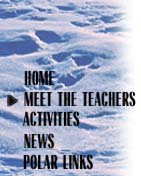
|
|
2 March, 2002
How do you begin to gather information? What are some of the first things
that we will be doing to begin our research on Little Diomede?
When coming to do field research as a social scientist its very important to
make it a priority to make connections with people, and keep in mind that the
process of doing this kind of social science research is very personal. Dr.
Jolles feels that "what other scientists call 'data' is often the detailed
story of a person's life" which can lead to a much deeper understanding of
the human experience. The information that we will be documenting over the
course of this research expedition is very much tied to the personal and
family histories of real people and will be made public in the form of
notebooks that will be returned to the community.
In fact, one of our first tasks is to begin by distributing copies of a 300
page notebook that Carol has compiled from previous interviews with elders,
some of whom have since passed away. She has come prepared with seventy
copies and we begin by knocking on doors, introducing ourselves and making
sure that a copy is given to every household in the village as well as to the
school for use as part of the curriculum. This project is very much seen as
a joint project between the researcher(s) and the community from which the
information comes, and the information that we are gathering will be made
public and returned to the community.
During this first phase of her field work, I will be accompanying and
parcticipating with Carol in the interview process as she begins to record a
series of individual interviews about subsistence knowledge and activities
and the way that such knowledge is shared and used. We will also be
interested in learning about changes that have taken place, and continue to
take place, to the way of life here on this arctic island. It's important to
remember that as remote as Diomede is, it has had modern amenities such as
electricity and telephones since the 1970s. Some traditional ways have long
since given way to change, for example, snowmobiles have replace dogsleds.
Modernization and access to technology has effected change here just as it
has throughout other towns, villages, and cities across the United States.
A great deal of knowledge exists outside the written record. That knowledge
is extremely valuable and worth preserving and sharing. When great value is
placed in and on peoples total life experience, their words and expressive
culture comes into play, and importance is placed on how people relate to
and explain their daily experiences and their pasts. In addition to a
written history, social science research can involve stories, carvings,
songs, dances, oral histories. And these areas are important cultural
elements that we hope explore and document as part of this first phase of the
project.
One of the goals is to interview and work with both men and women, focusing
on the different skills, roles, and knowledge that each gender plays in a
subsistence community. We are also interested in working with people from
different generations (elders, middle aged adults, and if possible, teenagers
and other younger people) who are in the process of learning subsistence
skills.
The term subsistence refers to the knowledge, tools and processes involved in
food getting activities as well as to the traditions that support them. In
order to develop an understanding of how people have survived in arctic
conditions, Dr. Jolles feels that it is also necessary to look at the food
storage and preparation activities that are an integral part of subsistence
communities.
In addition to parcticipating in the interview process, and working with Dr.
Jolles to develop working relationships within the community, a large part of
my role in this project will be photo-documentation. Along with written
copies of the interviews, I will be contributing copies of the images that I
am taking to be incorporated into future notebooks and returned to the
community as part of their community history. We also hope that as a
teacher, I can draw on my experience as an educator to help make this
knowledge relevant to people outside the community itself, and to build a
relationship between our two schools of children and the communities that
they are each a part of.
Contact the TEA in the field at
.
If you cannot connect through your browser, copy the
TEA's e-mail address in the "To:" line of
your favorite e-mail package.
|
